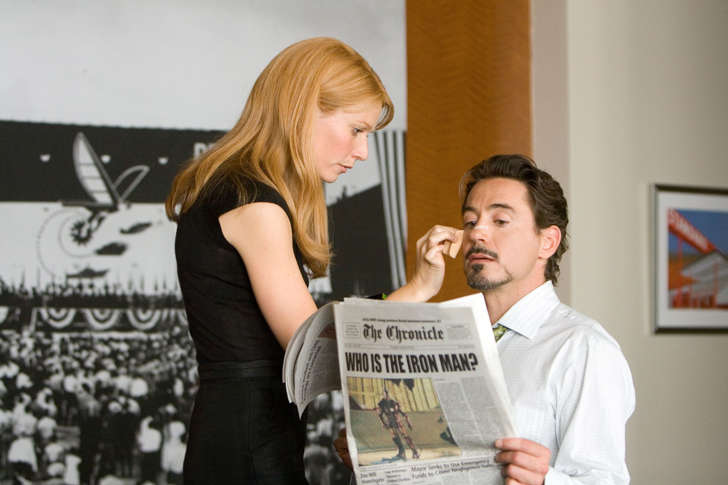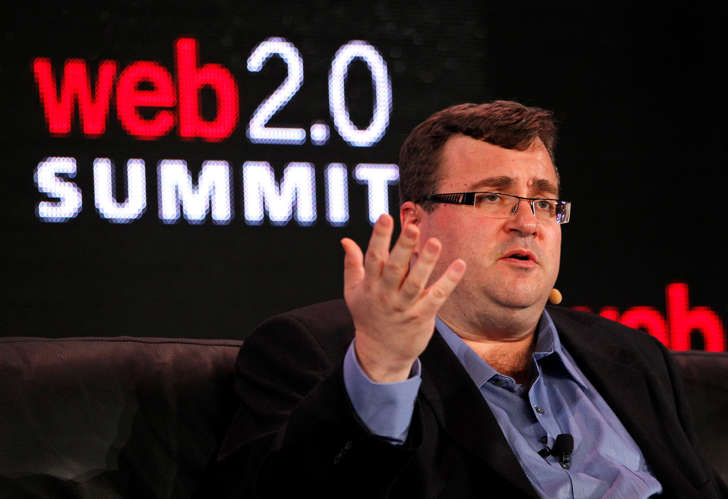LinkedIn Founder Reid Hoffman on the biggest lie employers tell employees

© Provided by Vox.com
In his new book The Alliance, Reid Hoffman argues that the relationship between employers and employees is built on "a dishonest conversation."
Hoffman would know. As co-founder and executive chairman of LinkedIn, he sits atop the largest, most data-rich hiring platform the world has ever seen. As a venture capitalist who made early investments in everything from Facebook to Airbnb, he's helped some of the era's most successful companies grow.
And now he wants both workers and employers to begin having honest conversations with each other — conversations that admit employment isn't for life, that loyalty only lasts so long as it coincides with self-interest, and that the relationship doesn't have to end when the worker leaves.
1) The biggest lie that employers tell employees
 © AP Gwyneth Paltrow plays Pepper Potts, assistant to billionaire industrialist Tony Stark, played by Robert Downey Jr. in "Iron Man.""The biggest lie is that the employment relationship is like family," Hoffman says.
© AP Gwyneth Paltrow plays Pepper Potts, assistant to billionaire industrialist Tony Stark, played by Robert Downey Jr. in "Iron Man.""The biggest lie is that the employment relationship is like family," Hoffman says.
He goes on to describe two versions of the lie. "One is where the employer is actually deluding themselves." Employers may want to believe their workplace really is like a family, and, in that moment, they may convince themselves it actually is like a family.
The other version of the lie comes because the employer wants the employee to believe it. "They really want the employee to be loyal to the company," Hoffman continues. "That's when it gets deceptive."
But the employer-employee relationship isn't like a family. "You don't fire your kid because of bad grades," Hoffman says.
2) The biggest lie employees tell employers
 © Getty Robin van Persie left Arsenal to join ManchesterBut it's not just employers who lie. Prospective employees do, too.
© Getty Robin van Persie left Arsenal to join ManchesterBut it's not just employers who lie. Prospective employees do, too.
"They know that employers want loyalty," Hoffman says. "They know they want to hear, 'Oh, I plan on working here for the rest of my career.' But most employees recognize that career progression probably requires eventually moving to another company. But that never comes up."
This is core to Hoffman's idea that both employers and employees should look at a particular job less as a lifetime contract and more as a "tour of duty" — a limited-time engagement meant to achieve specific ends on both sides. But until employers stop pretending employees are family and employees stop pretending their aim is a job they'll never leave, neither side can have that conversation.
3) The most unusual question LinkedIn asks prospective hires
In his new book The Alliance, Reid Hoffman argues that the relationship between employers and employees is built on "a dishonest conversation."
Hoffman would know. As co-founder and executive chairman of LinkedIn, he sits atop the largest, most data-rich hiring platform the world has ever seen. As a venture capitalist who made early investments in everything from Facebook to Airbnb, he's helped some of the era's most successful companies grow.
And now he wants both workers and employers to begin having honest conversations with each other — conversations that admit employment isn't for life, that loyalty only lasts so long as it coincides with self-interest, and that the relationship doesn't have to end when the worker leaves.
1) The biggest lie that employers tell employees
 © AP Gwyneth Paltrow plays Pepper Potts, assistant to billionaire industrialist Tony Stark, played by Robert Downey Jr. in "Iron Man.""The biggest lie is that the employment relationship is like family," Hoffman says.
© AP Gwyneth Paltrow plays Pepper Potts, assistant to billionaire industrialist Tony Stark, played by Robert Downey Jr. in "Iron Man.""The biggest lie is that the employment relationship is like family," Hoffman says.He goes on to describe two versions of the lie. "One is where the employer is actually deluding themselves." Employers may want to believe their workplace really is like a family, and, in that moment, they may convince themselves it actually is like a family.
The other version of the lie comes because the employer wants the employee to believe it. "They really want the employee to be loyal to the company," Hoffman continues. "That's when it gets deceptive."
But the employer-employee relationship isn't like a family. "You don't fire your kid because of bad grades," Hoffman says.
2) The biggest lie employees tell employers
 © Getty Robin van Persie left Arsenal to join ManchesterBut it's not just employers who lie. Prospective employees do, too.
© Getty Robin van Persie left Arsenal to join ManchesterBut it's not just employers who lie. Prospective employees do, too."They know that employers want loyalty," Hoffman says. "They know they want to hear, 'Oh, I plan on working here for the rest of my career.' But most employees recognize that career progression probably requires eventually moving to another company. But that never comes up."
This is core to Hoffman's idea that both employers and employees should look at a particular job less as a lifetime contract and more as a "tour of duty" — a limited-time engagement meant to achieve specific ends on both sides. But until employers stop pretending employees are family and employees stop pretending their aim is a job they'll never leave, neither side can have that conversation.
3) The most unusual question LinkedIn asks prospective hires

© Provided by Vox.com LinkedIn Corp.'s IPO Awaited On Wall Street
LinkedIn is an organization dedicated to helping other companies hire talent. It has access to more hiring data than arguably any other corporation on Earth. So I asked Hoffman: how do they hire? What do they ask that most companies don't?
"All of our managers and recruiters ask about how working here will be transformational to your career," Hoffman says. "So we'll ask, 'What's the next job that you would like to have post-LinkedIn?' That's not because we don't want our stars to stay at LinkedIn for a long time. It's because we're so committed to the idea that we're going to be transformative in the prospective employee's career. So we need to know, what's the next job after this? What do you want it to be?"
But don't job candidates find that weird?
"No," Hoffman says. "It's framed as, 'We're planning on having a huge impact in your career if you're working here.' And they find that liberating. It brings some honesty to what is otherwise kind of a collective self-deception dance. And it also means that when they leave, we still care about them."
"I was at an Airbnb board meeting and I ran into two former LinkedIn employees who walked up to me and said, 'Hey, how's it going? I'm working here now. I'd love to tell you about some of the stuff that I'm learning.' They know the way that we operate, is not, 'Oh, you've left LinkedIn, so you're no longer part of our tribe.' We continue to be allies. We can continue to try to help each other. That lets them come up and start telling me things about things could be really helpful to LinkedIn."
4) Employers put too much weight on interviews, and too little weight on references
 © Corbis Job interviewA key part of every hiring process I've ever been a part of — both as the applicant and as the employer — is the job interview. And I've never felt very good about it. Don't job interviews bias you toward gregariousness? Is there any real reason to believe shy employees perform worse than extroverted ones?
© Corbis Job interviewA key part of every hiring process I've ever been a part of — both as the applicant and as the employer — is the job interview. And I've never felt very good about it. Don't job interviews bias you toward gregariousness? Is there any real reason to believe shy employees perform worse than extroverted ones?
"I think you can learn some useful things from an interview," Hoffman says. "You just have to be clear about what it is you're actually trying to learn. I think you can learn about chemistry and fit. I think you can learn about a person's immediate response to a challenge. But if you told me, 'Pick one — you could either get references or an interview,' I would pick references every day of the week.
"I advise all the companies that I affiliate with to take reference checking very seriously. References actually tell you how people work, what their work ethic is. That is a critical piece of data that cannot be put aside or done casually. Frequently employers are so casual about references they either a) don't check them, or b) only check the ones the prospective candidate gives them. In fact, you want both those references and others."
5) The case for hiring your friends
 © Bloomberg Remember Web 2.0?
© Bloomberg Remember Web 2.0?
Hoffman's chief of staff, Ben Casnocha, wrote an interesting piece on leadership lessons he's learned from Hoffman. This one in particular surprised me: "If you’re choosing between working with someone who’s a trusted friend and a 7 out of 10 on competence, versus a stranger who’s a 9 out of 10 on competence, who should you pick? Answer: if the trusted friend is a fast learner, pick the trusted friend."
The normal management guidance is don't hire your friends. According to Nick Bilton's history of Twitter, when Evan Williams asked legendary CEO coach Bill Campbell what the worst mistake he could make is, Campbell replied: "Hire your fucking friends!" So I asked Hoffman why he believes in hiring friends.
"You need to handle it well," Hoffman replied. "If I get to the point where I'm hiring a friend, I say, 'Look. Here's how we keep the friendship and the work stuff different. Here's how I'm going to treat you a little differently as a friend. Here's how you're going to act a little differently as a friend.' I'm going to be clear about the fact that I'm not going to privilege them at all in the continuum to the job and promotions and bonuses. All of that will be done in a very fair way.
"On the other hand, I will actually, as a friend, go out of my way to invest even more energy than I normally do to make this work. I'm committing to put in a little bit more energy. In return, one thing is I want you, as a friend, to do the same. The benefit you get from this is both a) a higher level of trust, and b) you get to work with people that you actually really like to spend time with. Which usually facilitates a generally positive working relationship anyway."
6) How philosophy training makes you a better investor
 © Reuters A Greek flag flutters by a statue of ancient Greek philosopher Socrates in AthensHoffman's background isn't typical. He didn't study computer science or get an MBA. He studied philosophy. And he thinks he's better off for it.
© Reuters A Greek flag flutters by a statue of ancient Greek philosopher Socrates in AthensHoffman's background isn't typical. He didn't study computer science or get an MBA. He studied philosophy. And he thinks he's better off for it.
"One of the things that philosophy is very helpful on is how to think pretty precisely about arguments, and an investment thesis is fundamentally an argument. Part of philosophical training is making you really understand how good an argument is and how to think through the alternatives. Philosophy is really good at posing the question, 'If the universe were such that this data would be different or the universe was such that this framework would be wrong, what happens to the argument then?' Questioning those premises really helps you figure out why someone smart might actually hold a different point of view.
"We live in a probabilistic universe, and we tend to think in determinist ways. If A is data-driven and I think I have that data, how certain am I that I have that data? What could I discover that might actually tell me that that data is formulated wrongly? When you dig into it, most of your arguments are actually probabilistic. They're not certain, even when you have data. You're really trying to get a sense of whether you have a reasonable bet on the probability."
LinkedIn is an organization dedicated to helping other companies hire talent. It has access to more hiring data than arguably any other corporation on Earth. So I asked Hoffman: how do they hire? What do they ask that most companies don't?
"All of our managers and recruiters ask about how working here will be transformational to your career," Hoffman says. "So we'll ask, 'What's the next job that you would like to have post-LinkedIn?' That's not because we don't want our stars to stay at LinkedIn for a long time. It's because we're so committed to the idea that we're going to be transformative in the prospective employee's career. So we need to know, what's the next job after this? What do you want it to be?"
But don't job candidates find that weird?
"No," Hoffman says. "It's framed as, 'We're planning on having a huge impact in your career if you're working here.' And they find that liberating. It brings some honesty to what is otherwise kind of a collective self-deception dance. And it also means that when they leave, we still care about them."
"I was at an Airbnb board meeting and I ran into two former LinkedIn employees who walked up to me and said, 'Hey, how's it going? I'm working here now. I'd love to tell you about some of the stuff that I'm learning.' They know the way that we operate, is not, 'Oh, you've left LinkedIn, so you're no longer part of our tribe.' We continue to be allies. We can continue to try to help each other. That lets them come up and start telling me things about things could be really helpful to LinkedIn."
4) Employers put too much weight on interviews, and too little weight on references
 © Corbis Job interviewA key part of every hiring process I've ever been a part of — both as the applicant and as the employer — is the job interview. And I've never felt very good about it. Don't job interviews bias you toward gregariousness? Is there any real reason to believe shy employees perform worse than extroverted ones?
© Corbis Job interviewA key part of every hiring process I've ever been a part of — both as the applicant and as the employer — is the job interview. And I've never felt very good about it. Don't job interviews bias you toward gregariousness? Is there any real reason to believe shy employees perform worse than extroverted ones?"I think you can learn some useful things from an interview," Hoffman says. "You just have to be clear about what it is you're actually trying to learn. I think you can learn about chemistry and fit. I think you can learn about a person's immediate response to a challenge. But if you told me, 'Pick one — you could either get references or an interview,' I would pick references every day of the week.
"I advise all the companies that I affiliate with to take reference checking very seriously. References actually tell you how people work, what their work ethic is. That is a critical piece of data that cannot be put aside or done casually. Frequently employers are so casual about references they either a) don't check them, or b) only check the ones the prospective candidate gives them. In fact, you want both those references and others."
5) The case for hiring your friends
 © Bloomberg Remember Web 2.0?
© Bloomberg Remember Web 2.0?Hoffman's chief of staff, Ben Casnocha, wrote an interesting piece on leadership lessons he's learned from Hoffman. This one in particular surprised me: "If you’re choosing between working with someone who’s a trusted friend and a 7 out of 10 on competence, versus a stranger who’s a 9 out of 10 on competence, who should you pick? Answer: if the trusted friend is a fast learner, pick the trusted friend."
The normal management guidance is don't hire your friends. According to Nick Bilton's history of Twitter, when Evan Williams asked legendary CEO coach Bill Campbell what the worst mistake he could make is, Campbell replied: "Hire your fucking friends!" So I asked Hoffman why he believes in hiring friends.
"You need to handle it well," Hoffman replied. "If I get to the point where I'm hiring a friend, I say, 'Look. Here's how we keep the friendship and the work stuff different. Here's how I'm going to treat you a little differently as a friend. Here's how you're going to act a little differently as a friend.' I'm going to be clear about the fact that I'm not going to privilege them at all in the continuum to the job and promotions and bonuses. All of that will be done in a very fair way.
"On the other hand, I will actually, as a friend, go out of my way to invest even more energy than I normally do to make this work. I'm committing to put in a little bit more energy. In return, one thing is I want you, as a friend, to do the same. The benefit you get from this is both a) a higher level of trust, and b) you get to work with people that you actually really like to spend time with. Which usually facilitates a generally positive working relationship anyway."
6) How philosophy training makes you a better investor
 © Reuters A Greek flag flutters by a statue of ancient Greek philosopher Socrates in AthensHoffman's background isn't typical. He didn't study computer science or get an MBA. He studied philosophy. And he thinks he's better off for it.
© Reuters A Greek flag flutters by a statue of ancient Greek philosopher Socrates in AthensHoffman's background isn't typical. He didn't study computer science or get an MBA. He studied philosophy. And he thinks he's better off for it."One of the things that philosophy is very helpful on is how to think pretty precisely about arguments, and an investment thesis is fundamentally an argument. Part of philosophical training is making you really understand how good an argument is and how to think through the alternatives. Philosophy is really good at posing the question, 'If the universe were such that this data would be different or the universe was such that this framework would be wrong, what happens to the argument then?' Questioning those premises really helps you figure out why someone smart might actually hold a different point of view.
"We live in a probabilistic universe, and we tend to think in determinist ways. If A is data-driven and I think I have that data, how certain am I that I have that data? What could I discover that might actually tell me that that data is formulated wrongly? When you dig into it, most of your arguments are actually probabilistic. They're not certain, even when you have data. You're really trying to get a sense of whether you have a reasonable bet on the probability."

No comments:
Post a Comment